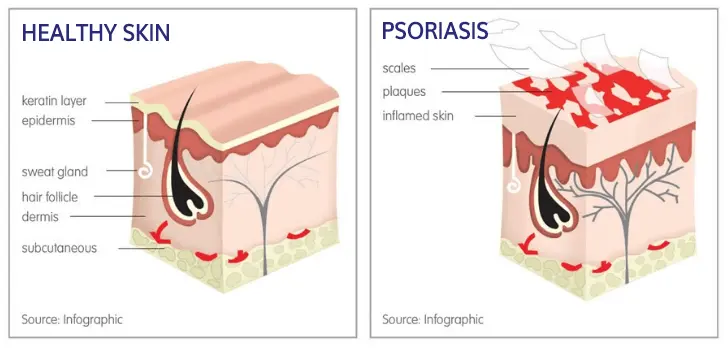
🩺 Understanding Psoriasis and Its Impact
Psoriasis is a chronic condition that affects millions of Americans, causing itching, redness, and irritation on the skin. While it’s not contagious, it can have a significant impact on one’s emotional and physical well-being. The good news is that advancements in medical treatments for psoriasis are helping individuals manage the disease more effectively than ever before.
💡 Can Psoriasis Be Cured? The Current State of Research
Currently, there is no definitive cure for psoriasis. However, medical research continues to explore new treatment avenues, and many patients can experience long-lasting relief from their symptoms with the right therapies. The goal of treatment is not only to manage symptoms but also to prevent flare-ups and reduce the severity of the disease.
Here’s a look at some of the most effective psoriasis treatments available today:
| Treatment Type | Description | Effectiveness | Cost Range |
|---|---|---|---|
| Topical Treatments | Creams, ointments, and shampoos for direct application | Can reduce inflammation and slow skin cell turnover | $20 - $300 per month |
| Phototherapy (Light Therapy) | Exposure to UVB light to slow down skin cell production | Effective for moderate to severe cases | $50 - $150 per session (multiple sessions needed) |
| Systemic Medications | Oral or injectable drugs to target the immune system | Highly effective for severe psoriasis | $300 - $2,000 per month (depending on medication) |
| Biologic Drugs | Targeted therapies that adjust the immune system | Can provide long-term relief | $10,000 - $20,000 per year |
| Natural and Alternative Remedies | Herbal treatments, diet changes, and stress management | Can complement traditional treatments | Varies widely |
💆♀️ Topical Treatments: The First Line of Defense
Topical treatments are often the first approach in managing psoriasis. These include creams, ointments, and shampoos designed to reduce inflammation and slow down skin cell turnover. Steroid creams are the most commonly used, but there are also calcipotriene creams (vitamin D analogs) and coal tar products available. For mild cases, these treatments can be effective in clearing up patches and reducing discomfort.
Topical treatments are typically affordable, with costs ranging from $20 to $300 per month. However, they may need to be applied consistently for a significant amount of time to achieve the best results.
🌞 Phototherapy: Harnessing the Power of Light
For individuals with moderate to severe psoriasis, phototherapy (also known as light therapy) may be recommended. Phototherapy involves controlled exposure to UVB light, which helps slow down the rapid production of skin cells associated with psoriasis. Phototherapy is usually administered in a clinical setting, but home units are also available for certain cases.
The effectiveness of phototherapy is well-established, especially for scalp psoriasis and psoriasis on large areas of the body. The cost per session typically ranges from $50 to $150, and multiple sessions are usually required for optimal results.
💊 Systemic Medications: For Severe Cases
Systemic medications are typically reserved for individuals with severe psoriasis who don’t respond well to topical treatments or phototherapy. These medications work by targeting the immune system to reduce inflammation and prevent skin cell overproduction. They are available in both oral and injectable forms.
Common systemic treatments include methotrexate, cyclosporine, and retinoids. These medications can be highly effective but come with potential side effects. They can cost anywhere from $300 to $2,000 per month, depending on the specific drug.
🧬 Biologic Drugs: The New Frontier in Psoriasis Treatment
In recent years, biologic drugs have revolutionized the treatment of psoriasis. These targeted therapies work by modifying the immune system’s behavior, offering significant relief for those with moderate to severe cases of the disease. Common biologics include adalimumab (Humira), etanercept (Enbrel), and ustekinumab (Stelara).
Biologics are often highly effective, providing long-term relief and requiring fewer treatments than traditional medications. However, they can be expensive, with annual costs ranging from $10,000 to $20,000. Despite the high cost, biologics are often covered by insurance and are considered a breakthrough in psoriasis treatment.
🌱 Natural and Alternative Remedies: Complementary Approaches
For those interested in natural remedies, some herbal treatments and diet changes can help manage psoriasis symptoms. Common alternatives include aloe vera, turmeric, and fish oil supplements, which are believed to have anti-inflammatory properties. Additionally, managing stress and maintaining a healthy lifestyle can contribute to reducing flare-ups.
While these remedies are not a substitute for medical treatment, they can be useful as complementary options. The cost varies widely, depending on the remedy, but they are typically more affordable than prescription medications.
🏁 Final Thoughts: Managing Psoriasis Effectively
While psoriasis cannot currently be cured, there are a variety of effective treatments available that can help you manage the disease and improve your quality of life. From topical treatments to biologic drugs, the latest medical advances have made it easier than ever to live with psoriasis. If you’re struggling with psoriasis, consult with your healthcare provider to determine the best treatment plan for your unique needs 🌟.
